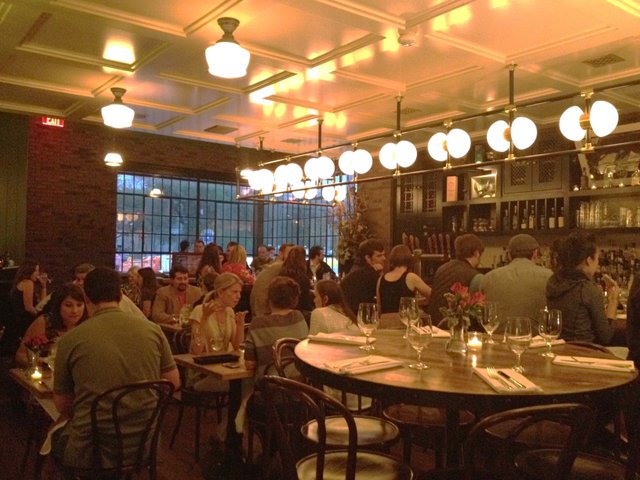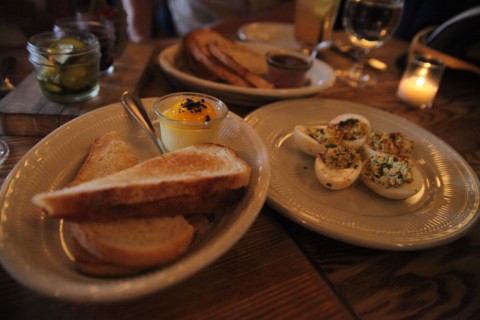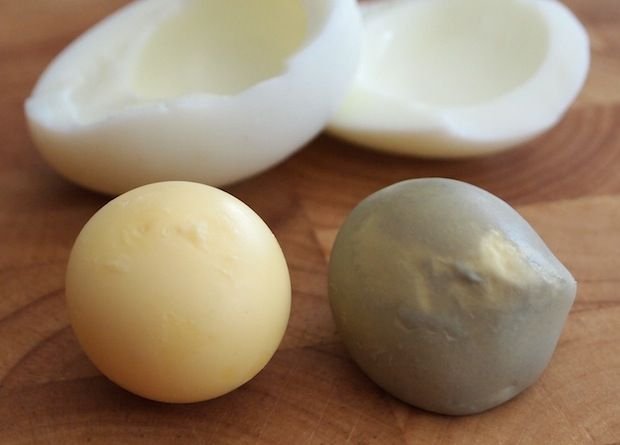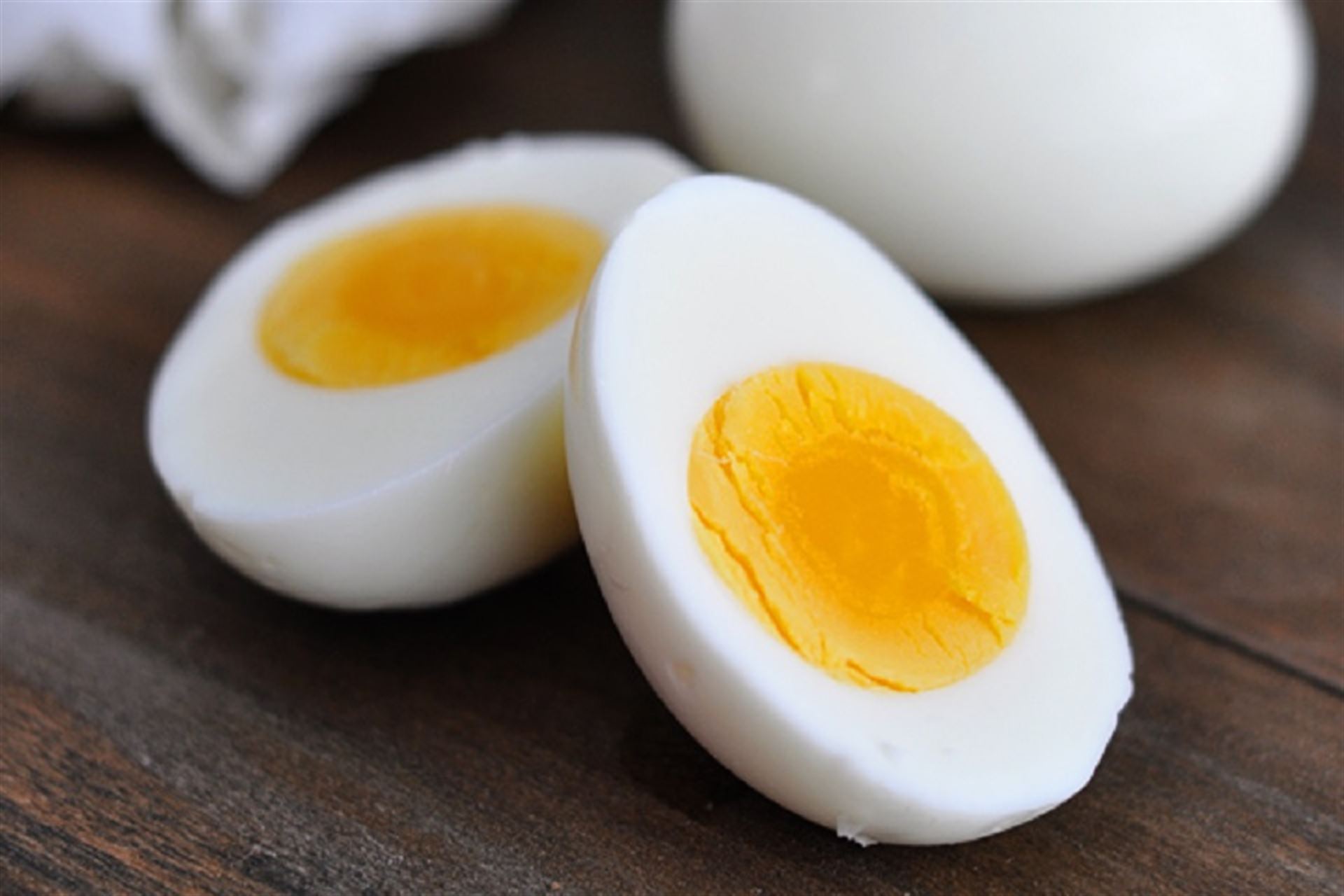Life as an Eggspert Chef: How to Cook Large Quantities of Hard Boiled Eggs Perfectly
For those of you that are impatient (trust me, I'm not judging), you are more than welcome to simply scroll down towards the bottom of the post and acquire the proper process to boiling large quantities of hard boiled eggs. I'd also like to mention this post has less to do with the actual recipe. Overall, it will be pertaining to the attention to detail expected of most chefs, as well as being peppered with a hint of science.
When I first began my blog on Steemit a month ago, I honestly had no idea what I wanted to write about. I posted some pictures, wrote about crypto a couple times and commented on a few posts. I was pretty much wandering adrift. It wasn’t until I began writing about topics that I loved and understood did I see a legitimate amount of success. For those of you that don’t follow me, I typically write about geology and other earth sciences as well. Recently, it dawned on me that writing about geology every day, may be unsustainable. Don’t get me wrong, I could write about geology for days, but here’s the thing– Steemit is a creative medium. The way I see it, my blog should be a bit more flexible and creative as well. Since I had luck talking about topics I actually knew, it got me thinking… I should write about others topics I’m knowledgeable about. Such as cooking!
Before I begin, let me give you a little background info about myself. Prior to me becoming a student and entrepreneur, I was a line cook and chef for roughly 10 years. I worked my way up from being a dishwasher to a prepared foods/kitchen consultant over that timespan, so I would consider myself to be moderately successful in the line of work. Over those years, I met some incredible chefs and all of them taught me invaluable tricks of the trade. One of the very first things they taught me, was how to properly cook an egg.
While cooking an egg may sound like an easy task, for certain chefs, it can be the deciding factor on whether you’ll be running your own station in their kitchen or peeling potatoes in a sink. Eggs are very gentle and highly susceptible to heat. In order to cook them perfectly (and I do mean perfectly), you have to give them special attention and understand certain techniques. Off the top of my head, I can think of at least 12 ways to cook an egg. That doesn’t include the plethora of foods that require an egg for them to be made e.g. pasta, mayonnaise, salad dressings, French toast, cakes, custard ice cream, etc. Point being, eggs are sort of a big deal in the culinary world.
 This is the dining room of the restaurant I cooked at. Unfortunately, I couldn't find any pictures of the kitchen. [Image Source]
This is the dining room of the restaurant I cooked at. Unfortunately, I couldn't find any pictures of the kitchen. [Image Source]
One of my first jobs as a cook was at an upscale English style gastropub in Austin, TX. I was hired to run the garde manger station (better known as cold side), until I proved I was able to work sautee or grill. A lot of chefs call cold side the “vacation station.” This couldn’t be further from the truth, but it’s a great way to egg on (pun intended) the new hire to work twice as hard. One of the more daunting tasks on my prep list, was that I had to boil and peel a 100 eggs every single day to make deviled eggs for lunch and dinner service. This was added on top of having to do all my other prep, which was never a short list– the pressure was real.
[Image Source] This picture shows two dishes we made at this restaurant. On the right were the deviled eggs and on the left was a truffle egg custard.

In this particular restaurant, I learned how to cook eggs perfectly and was deemed the title “eggspert.” I take pride in the fact I can cook an egg, every imaginable way, to perfection. In order to do this, it’s useful to understand how an egg reacts to heat.
At around 180 °F (82 °C) the white of an egg is considered to be the right temperature for consumption. At this temperature the white is firm, yet very tinder and un-rubbery. However, 180 °F is about 10 degrees warmer than what is considered to be the ideal temperature for an egg yolk. When you cook the egg yolk above 170 °F (77 °C), it will become dry and crumbly. Furthermore, there is iron in the yolk and sulfur in the white of an egg. When boiling an egg, the heat causes the iron and sulfur to react with each other creating a ferrous sulfide. Hence, why boiled eggs are rather stinky. This reaction is important to remember.

When you bite into a boiled egg, sometimes you’ll see a greyish-green color on the outside of the round yolk, rather than a bright yellow. This color is a product of the reaction that occurs between the iron in the egg white and the sulfur in the yolk. If you see this color, you’re actually eating an egg that was way overcooked– most people don’t know this. When I boiled those 100 eggs everyday, I cooked them all in one massive pot. Since the heat is coming from the bottom, it’s difficult to cook all 100 eggs perfectly because the eggs at the bottom of the pot are having heat applied to them for slightly longer. Roughly 5 egg yolks would come out a little greyish, but they were still perfectly acceptable for the deviled egg recipe.
The process for making a large (48+) batch of hard boiled eggs is as follows:
Put the quantity of eggs you want to boil in a large pot or saucepan and then fill the pot with cold water until it’s just covering the eggs.
Turn the stove just below the highest setting setting.
Next you’ll need to pay close attention to the water. As soon as it comes to a rolling boil you want to immediately cut off the heat and carefully remove the pot from the hot surface. You will then cover the pot with a lid for a total of 9 minutes, on the dot. This is the most important step because you do not want to cook it for any less or more time. I suggest setting a timer for this part.
When the timer goes off, carefully pour the hot water into a sink and cool down the eggs in an ice bath. This can all be accomplished in the same pot. If you don’t have ice, simply run cold water over the eggs.
After about 5 minutes (or sooner if you’re brave) the egg should be safe to peel and eat. You’ll notice that the egg yolk has no greyish-green color.
Lastly, if you cook a smaller batch of eggs (3-6 count) and use this recipe, you'll get a medium boiled egg, which are my favorite style to begin with.
This process works perfectly, every single time. Though, it should be noted, if you live at higher altitudes water can take significantly longer to come to a boil. This is due to the decrease of atmospheric pressure that occurs when going up in altitude. You should be fine at any altitude up to 2000 ft. Above that, some testing may need to be done to achieve the same results.
If you’ve come this far, I seriously congratulate you. I’m sure you’re wondering how I could go on about a boiled egg for so long. To be fair, eggs are a fundamental ingredient when it comes to cooking. Also, if you can cook an egg properly, then in all likelihood you can cook anything else properly as well. This is because they are so sensitive while cooking and are easy to make mistakes with. It’s important to understand that cooking is in fact chemistry. The first chemists in the world were actually cooks! They didn’t necessarily know the technical aspects of it, but the Austrians and French have known how to cook a croissant for over 700 years and making the perfect croissant is no easy feat.
Anyway, the recipe I just shared has won me many bets in the kitchen. Truthfully, this post was less about the actual recipe and more about the attention to detail most chefs are expected to maintain. At most of the restaurants I cooked at, mistakes weren’t acceptable; meaning to work in a kitchen, you need to be able to handle stressful situations with ease. Personally, the line of work just wasn’t for me in the end. I found myself being jaded by the culture and repetition of it all. That’s not to say I don’t respect the line of work. I absolutely admired the people I worked alongside with, that were able to perform at maximum efficiency, day in and day out. While I did this myself for many years as well, there came a point in my life where I just wanted to experience something else. Hence, why I’m currently studying geology.
If you enjoyed reading this post, be sure to give me a follow and check out my blog. The goal of this blog isn’t to earn money per se. While that is a nice benefit, I’m more interested in networking, learning and informing.
Bibliography:
All information provided above is original and the result of working as a chef, line cook and prep cook for nearly 10 years.

Nice too have you on Steemit! Now I have definitely more knowledge coming up from you about food. I love eating and for sure I would like to know how does my all precious meals being prepared and hopefully, I'll be able to perfect it too! I'll definitely keep an eye on you :) Good Job!!
Hey there! Thanks for the comment! Be sure to give me a follow if you like my content. :)
hi @keephy, so - from boiling eggs to studying geology, very interesting :D! I like your writing style :)
Thank you! Sorry for the late reply. I have received more replies to this post than expected!
he follow and upvote I follow and upvote back
Great article! I never knew why some hardboiled eggs had a green yoke and some didn't. I usually like my hardboiled eggs hardboiled over easy (slightly runny yoke) with salt and pepper.
Thanks! I only like soft boiled eggs on certain things. Like for ramen, I love a good soft boiled egg. Especially if it's ajitsuke tamago.
I love hard boiled eggs, but they have always been hit or miss for me. I usually cook at least one extra so that I can err on the side of under cooked, check one, and continue boiling them if needed. I will definitely be trying this out!
Just remember, that recipe is for cooking very large quantities! The recipe was more of a novel mention than anything. However, if you do follow that recipe you will get a perfect medium boil, which are absolutely delicious. The yoke isn't runny, but it also isn't very dry. For a perfect boil, bring to a boil over medium heat. Once it comes to a rolling boil, cut the heat and cover for 11 minutes. After 11 minutes cool them in an ice bath.
Also thank you for the follow. I followed you back as well! Cheers!
Haha I loved this! I have a mild addiction to eggs.. they make everything better! Thank you for adding some science!
That is again a useful post. Thanks for this input.
Most of the time I only have to do 4 to 6 egss, but you never know...
OK, so don't shoot me, but that was an egg-cellent post :)
In all seriousness I love that you were able to write about the complexity of an egg. I am partial to eggs in all there glory and knowing how to hard-boil a larger quantity and to take them off the stove is a new way of doing that for me.
You are as one might say, somewhat of an eggs-pert...
Lol. That's my name. Don't wear it out ;)
I love this method. Have been using it to cook my personal eggs, or eggs for the whole family, for a few years now. Great trick to share for everyone. Boiling eggs perfectly has always been one of those tricky things for some people.
Right? I feel like they are so fickle, but it truly tests how much attention to detail a cook has.
Oh yeah, boiling the perfect egg is and art form!
This Article is so Amazing! Just like Cooking Rice, It's one of those Processes of Cooking that Must Be Mastered!
Thanks, @keephy! I shared it with some of the Recipe-Hungry Pintrest people!
Maybe we can win more heads over to Seemit with your Post!
https://pin.it/u7h4icq2rgvw3r